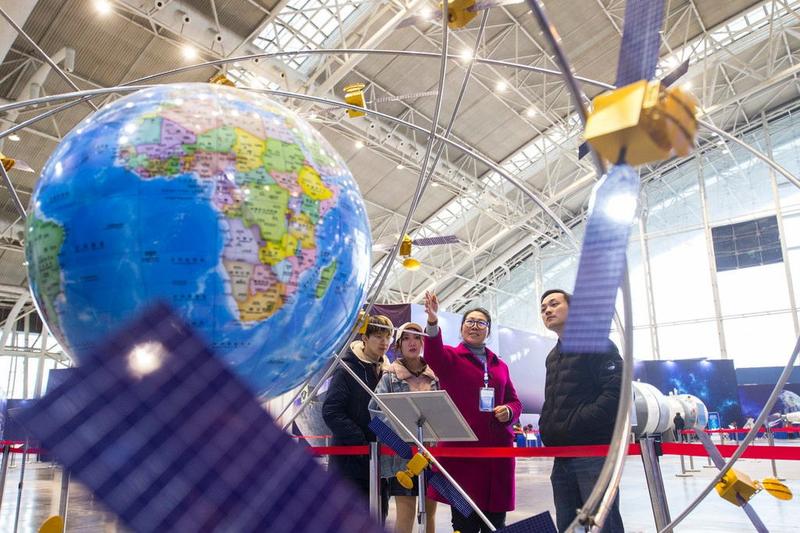 A guide introduces the BeiDou Navigation Satellite System to visitors at a space-themed exhibition in Nanjing, Jiangsu province, Feb 18, 2019. (PHOTO / IC)
A guide introduces the BeiDou Navigation Satellite System to visitors at a space-themed exhibition in Nanjing, Jiangsu province, Feb 18, 2019. (PHOTO / IC)
Construction of China's first privately owned satellite plant began on Tuesday in Tangshan, a coastal city in Hebei province, and is expected to start operation next year, according to its owner.
The plant is in Tangshan's Lunan district and will become operational around the beginning of 2021. Its initial production capacity will be about 100 satellites with weights ranging from 50 to 500 kilograms, Commsat, a private satellite producer in Beijing, said in a statement on Tuesday.
Its initial production capacity will be about 100 satellites with weights ranging from 50 to 500 kilograms, Commsat, a private satellite producer in Beijing, said in a statement on Tuesday
Commsat President Peng Yuanyuan said in the statement that the Tangshan plant will adopt pulse-line manufacturing and intelligence technologies to make satellites in a fast, cost-effective manner.
READ MORE: China launches 5 new remote-sensing satellites
The plant will not only manufacture satellites but also conduct research on space-based communication technologies and ground applications, she said.
Ding Xiufeng, mayor of Tangshan, said at the groundbreaking ceremony that the establishment of the satellite factory will boost the city's endeavor to foster local high-tech industries such as satellite-based internet and artificial intelligence.
The move will also help to speed up Tangshan's economic transformation, the mayor added.
Currently, all satellite manufacturing facilities in China belong to State-owned entities like China Aerospace Science and Technology Corp and Chinese Academy of Sciences.
In addition to the Tangshan factory, Commsat is also working with the government in Yibin, Sichuan province, to prepare for the construction of a production plant for satellite-based payloads.
Pang Zhihao, a space activity researcher and author in Beijing, said several Chinese private satellite makers have plans to build their own plants.
ALSO READ: China soars ahead with space missions
"That will be good for China's space industry because more competition and options will diversify the market and also strengthen the country's overall space capability," he said.
Founded in June 2015 in Beijing, Commsat is one of the leading private enterprises in China's space business sector. It has placed eight small satellites it designed and built in orbit. Its revenue stood at nearly 100 million yuan (US$14.7 million) in 2019, and the company has plans to develop and make four to five satellites this year.
Commsat CEO Xie Tao said that the domestic satellite communication sector expects "explosive growth" in the next three to five years.


